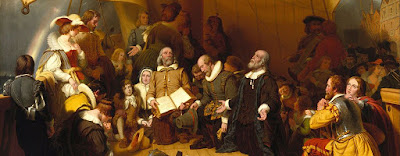Social Media Testifies To The Covenant Of Works
By Dr. R. Scott Clark - Posted at The Heidelblog:
In Colossians 2:8 Paul warned the Colossians Christians not to be taken captive by unbelieving ways of thinking (philosophies) nor by “the stoicheia (στοιχεῖα) of the world.” The noun stoicheia is usually translated with something like “elemental principles” or the like. That is a possibility but it leaves unanswered the question, what are the elemental principles? Sometimes it is argued that it is a reference to the principles of physics or natural science. There is a good case to be made, however, by analogy with his use of the same term in Galatians 4:3, 8 in a similar context, that by it he simply means “law”and specifically, in this case, natural law. The study of physics does teach us something about the existence of natural laws. If we drop a coin from a height it will do what it does, in the ordinary providence of God, by nature. According to the traditional Reformed understanding of Scripture, God instituted a law in the garden, which we call in the Belgic Confession (Art. 14) “the commandment of life.” Just a few years after that, Reformed theologians began calling the “commandment of life” a “covenant of works,” which nomenclature was adopted by the British Reformed at Westminster (WCF 7.2; 19.1, 6).
The essence of the covenant of works is the promise of life on condition of “perfect and personal obedience.” In the words of our Lord Jesus, “Do this and live” (Luke 10:28). The same law God gave to Adam is written upon the conscience of every human being, testifying to him that he is under personal obligation to perform perfect obedience to the natural, moral law which is inscribed on his conscience. Paul discusses this at length from Romans 1:18–2:15. The traditional Reformed explanation of this passage was that the same law God gave to Adam before the fall is substantially the same law revealed at Sinai and the same law revealed in nature.
In this space I have argued that apart from the covenant of grace administered in Christ’s visible, true church there is only a covenant of works. In that communion, where redeemed sinners gather together for worship and fellowship, grace predominates. The law is preached in its various uses and the gospel is announced and made visible in the sacraments. Life, however, apart from the administration of the covenant of grace, apart from God’s free acceptance of believers by grace alone, through faith alone, for Christ’s sake alone, is a covenant of works—not for acceptance with God but for life in this world.






Comments
Post a Comment
Welcome! Please feel free to comment, but anti-Christian comments or profanity will not be tolerated. Thank you, ed.